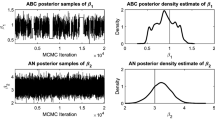Abstract
We generalize the DEnv (Distribution envelope determination) method for bounding the result of arithmetic operations on random variables with unknown dependence to higher-dimensional settings. In order to minimize both the influence of the coordinate frame and information loss we suggest a nested thicket representation for random variables and a corresponding intersection algorithm.
Similar content being viewed by others
References
Berleant, D. and Goodman-Strauss, C.: Bounding the Results of Arithmetic Operations on Random Variables of Unknown Dependency Using Intervals, Reliable Computing 4 (2) (1998), pp. 147–165.
Berleant, D., Xie, L., and Zhang, J.: Stattool: A Tool for Distribution Envelope Determination (DEnv), an Interval-Based Algorithm for Arithmetic Operations on Random Variables, Reliable Computing 9 (2) (2003), pp. 91–108.
Berleant, D. and Zhang, J.: Representation and Problem Solving with Distribution Envelope Determination, Reliability Engineering and System Safety 85 (1–3) (2004), pp. 153–168.
Berleant, D. and Zhang, J.: Using Pearson Correlation to Improve Envelopes around the Distributions of Functions, Reliable Computing 10 (2) (2004), pp. 139–161.
Hu, S.-M. and Wallner, J.: Error Propagation through Geometric Transformations, J. Geom. Graphics 8 (2) (2004), pp. 171–183.
Karloff, H.: Linear Programming, Birkhäuser, Boston, 1991.
Pottmann, H., Odehnal, B., Peternell, M., Wallner, J., and Ait Haddou, R.: On Optimal Tolerancing in Computer-Aided Design, in: Martin, R. and Wang, W. (eds), Geometric Modeling and Processing 2000, IEEE Computer Society, Los Alamitos, 2000, pp. 347–363.
Regan, H. A., Ferson, S., and Berleant, D.: Equivalence of Methods for Uncertainty Propagation of Real-Valued Random Variables, Internat. J. Approx. Reason. 36 (2004), pp. 1–30.
Requicha, A. A. G.: Towards a Theory of Geometric Tolerancing, Int. J. of Robotics Research 2 (1983), pp. 45–60.
Walley, P.: Measures of Uncertainty in Expert Systems, Artificial Intelligence 83 (1996), pp. 1–58.
Wallner, J., Krasauskas, R., and Pottmann, H.: Error Propagation in Geometric Constructions, Computer-Aided Design 32 (2000), pp. 631–641.
Wallner, J., Schröcker, H.-P., and Hu, S.-M.: Tolerances in Geometric Constraint Problems, Reliable Computing 11 (3) (2005), pp. 235–251.
Williamson, R. C. and Downs, T.: Probabilistic Arithmetic. I. Numerical Methods for Calculating Convolutions and Dependency Bounds, Internat. J. Approx. Reason. 4 (2) (1990), pp. 89–158.
Author information
Authors and Affiliations
Corresponding author
Rights and permissions
About this article
Cite this article
Schröcker, HP., Wallner, J. Geometric Constructions with Discretized Random Variables. Reliable Comput 12, 203–223 (2006). https://doi.org/10.1007/s11155-006-7219-2
Received:
Accepted:
Issue Date:
DOI: https://doi.org/10.1007/s11155-006-7219-2




